跨国公司的影响【外文翻译】
财务管理外文文献及翻译--跨国公司财务
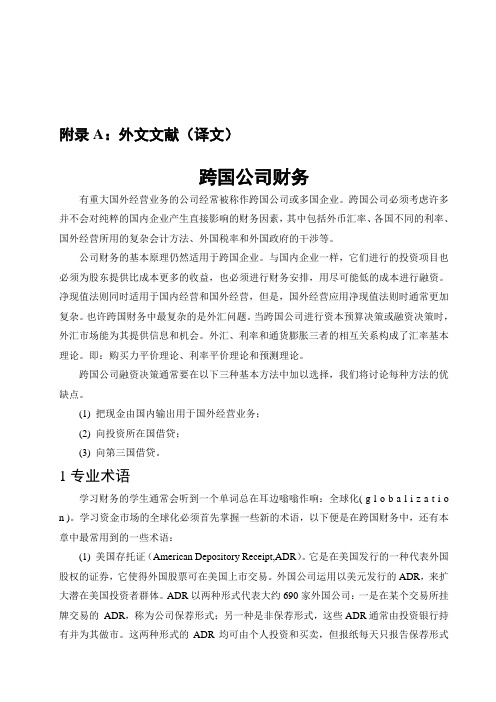
附录A:外文文献(译文)跨国公司财务有重大国外经营业务的公司经常被称作跨国公司或多国企业。
跨国公司必须考虑许多并不会对纯粹的国内企业产生直接影响的财务因素,其中包括外币汇率、各国不同的利率、国外经营所用的复杂会计方法、外国税率和外国政府的干涉等。
公司财务的基本原理仍然适用于跨国企业。
与国内企业一样,它们进行的投资项目也必须为股东提供比成本更多的收益,也必须进行财务安排,用尽可能低的成本进行融资。
净现值法则同时适用于国内经营和国外经营,但是,国外经营应用净现值法则时通常更加复杂。
也许跨国财务中最复杂的是外汇问题。
当跨国公司进行资本预算决策或融资决策时,外汇市场能为其提供信息和机会。
外汇、利率和通货膨胀三者的相互关系构成了汇率基本理论。
即:购买力平价理论、利率平价理论和预测理论。
跨国公司融资决策通常要在以下三种基本方法中加以选择,我们将讨论每种方法的优缺点。
(1) 把现金由国内输出用于国外经营业务;(2) 向投资所在国借贷;(3) 向第三国借贷。
1专业术语学习财务的学生通常会听到一个单词总在耳边嗡嗡作响:全球化( g l o b a l i z a t i o n )。
学习资金市场的全球化必须首先掌握一些新的术语,以下便是在跨国财务中,还有本章中最常用到的一些术语:(1) 美国存托证(American Depository Receipt,ADR)。
它是在美国发行的一种代表外国股权的证券,它使得外国股票可在美国上市交易。
外国公司运用以美元发行的ADR,来扩大潜在美国投资者群体。
ADR以两种形式代表大约690家外国公司:一是在某个交易所挂牌交易的ADR,称为公司保荐形式;另一种是非保荐形式,这些ADR通常由投资银行持有并为其做市。
这两种形式的ADR均可由个人投资和买卖,但报纸每天只报告保荐形式的存托证的交易情况。
(2) 交叉汇率(cross rate)。
它是指两种外国货币(通常都不是美元)之间的汇率。
跨国公司在国际贸易中的影响力
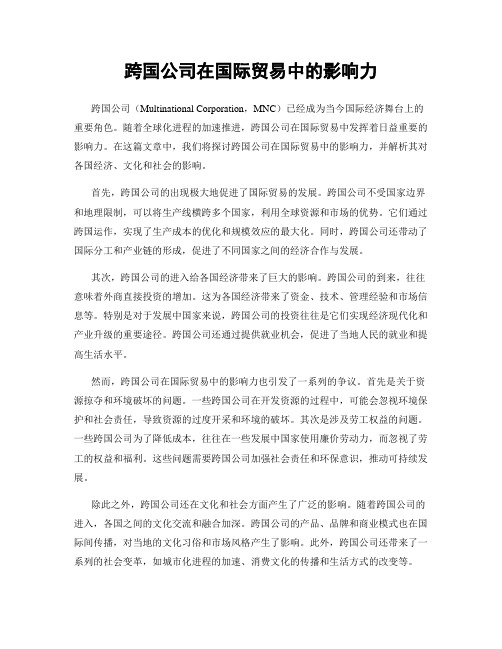
跨国公司在国际贸易中的影响力跨国公司(Multinational Corporation,MNC)已经成为当今国际经济舞台上的重要角色。
随着全球化进程的加速推进,跨国公司在国际贸易中发挥着日益重要的影响力。
在这篇文章中,我们将探讨跨国公司在国际贸易中的影响力,并解析其对各国经济、文化和社会的影响。
首先,跨国公司的出现极大地促进了国际贸易的发展。
跨国公司不受国家边界和地理限制,可以将生产线横跨多个国家,利用全球资源和市场的优势。
它们通过跨国运作,实现了生产成本的优化和规模效应的最大化。
同时,跨国公司还带动了国际分工和产业链的形成,促进了不同国家之间的经济合作与发展。
其次,跨国公司的进入给各国经济带来了巨大的影响。
跨国公司的到来,往往意味着外商直接投资的增加。
这为各国经济带来了资金、技术、管理经验和市场信息等。
特别是对于发展中国家来说,跨国公司的投资往往是它们实现经济现代化和产业升级的重要途径。
跨国公司还通过提供就业机会,促进了当地人民的就业和提高生活水平。
然而,跨国公司在国际贸易中的影响力也引发了一系列的争议。
首先是关于资源掠夺和环境破坏的问题。
一些跨国公司在开发资源的过程中,可能会忽视环境保护和社会责任,导致资源的过度开采和环境的破坏。
其次是涉及劳工权益的问题。
一些跨国公司为了降低成本,往往在一些发展中国家使用廉价劳动力,而忽视了劳工的权益和福利。
这些问题需要跨国公司加强社会责任和环保意识,推动可持续发展。
除此之外,跨国公司还在文化和社会方面产生了广泛的影响。
随着跨国公司的进入,各国之间的文化交流和融合加深。
跨国公司的产品、品牌和商业模式也在国际间传播,对当地的文化习俗和市场风格产生了影响。
此外,跨国公司还带来了一系列的社会变革,如城市化进程的加速、消费文化的传播和生活方式的改变等。
总之,跨国公司在国际贸易中发挥着重要的影响力。
它们促进了国际贸易的发展,带动了各国经济的增长和发展。
然而,跨国公司也面临着一系列的挑战和争议。
跨国公司的发展及对世界经济的影响
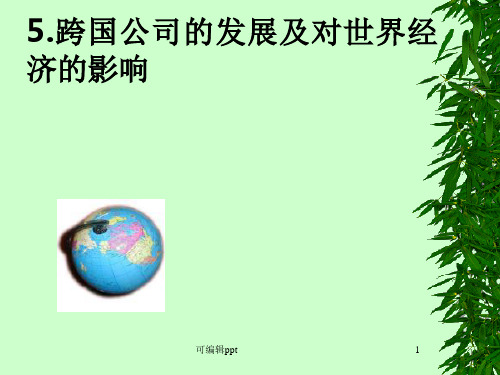
可编辑ppt
24
5.1.4 跨国公司的特征
可编辑ppt
25
(1)对外直接投资(FDI)是跨国 公司向外扩张的主要
第一阶段,主要是商品输出和在国 外建立销售分公司;
第二阶段,采用直接投资的方式, 绕过贸易壁垒,在国外建立生产和 销售网。
可编辑ppt
可编辑ppt
50
有助于东道国的资本形成,扩大 了生产和就业
促进了东道国企业竞争力的增强, 加快了产业结构的调整和升级 能够促进东道国的技术进步
可编辑ppt
51
5.3.2 对东道国经济的 消极影响
可编辑ppt
52
消极影响包括政治、经济、文 化等多方面的,尤其是对东道国的 技术控制和经济控制等。
可编辑ppt
联合国《2000年世界投资报告》:截至1999年底 ,跨国公司为载体的世界对外直接投资存量达 到50000亿美元,跨国公司的数量达到63000家 ,其附属公司至少达69万家,对东道国经济的 影响越来越突出。
可编辑ppt
12
跨国公司以资金、技术、品牌和销售网 络的优势驰骋世界市场,它们控制着全 球1/3的生产、2/3的国际贸易,70%的技 术专利,90%的国际直接投资 。
可编辑ppt
34
(4)跨国公司实行内部一体化 经营管理
可编辑ppt
35
公司内部实行高度集中的管理体制, 即以母公司为中心把遍布世界各地 的分支机构和子公司统一为一个有 机的整体。
可编辑ppt
36
(5)以开发新技术推动跨国公 司的发展
可编辑ppt
37
跨国公司是技术创新的主要拥 有者和技术发明的领头羊。
可编辑ppt
13
国际战略联盟成为跨国公司 发展模式的新趋势
跨国公司对发展中国家的影响
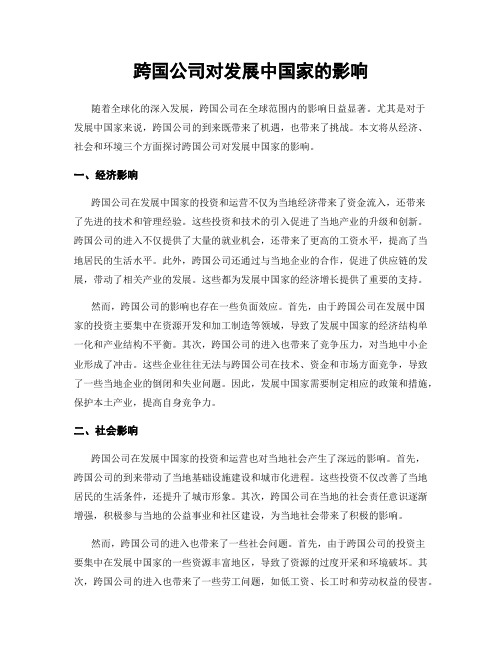
跨国公司对发展中国家的影响随着全球化的深入发展,跨国公司在全球范围内的影响日益显著。
尤其是对于发展中国家来说,跨国公司的到来既带来了机遇,也带来了挑战。
本文将从经济、社会和环境三个方面探讨跨国公司对发展中国家的影响。
一、经济影响跨国公司在发展中国家的投资和运营不仅为当地经济带来了资金流入,还带来了先进的技术和管理经验。
这些投资和技术的引入促进了当地产业的升级和创新。
跨国公司的进入不仅提供了大量的就业机会,还带来了更高的工资水平,提高了当地居民的生活水平。
此外,跨国公司还通过与当地企业的合作,促进了供应链的发展,带动了相关产业的发展。
这些都为发展中国家的经济增长提供了重要的支持。
然而,跨国公司的影响也存在一些负面效应。
首先,由于跨国公司在发展中国家的投资主要集中在资源开发和加工制造等领域,导致了发展中国家的经济结构单一化和产业结构不平衡。
其次,跨国公司的进入也带来了竞争压力,对当地中小企业形成了冲击。
这些企业往往无法与跨国公司在技术、资金和市场方面竞争,导致了一些当地企业的倒闭和失业问题。
因此,发展中国家需要制定相应的政策和措施,保护本土产业,提高自身竞争力。
二、社会影响跨国公司在发展中国家的投资和运营也对当地社会产生了深远的影响。
首先,跨国公司的到来带动了当地基础设施建设和城市化进程。
这些投资不仅改善了当地居民的生活条件,还提升了城市形象。
其次,跨国公司在当地的社会责任意识逐渐增强,积极参与当地的公益事业和社区建设,为当地社会带来了积极的影响。
然而,跨国公司的进入也带来了一些社会问题。
首先,由于跨国公司的投资主要集中在发展中国家的一些资源丰富地区,导致了资源的过度开采和环境破坏。
其次,跨国公司的进入也带来了一些劳工问题,如低工资、长工时和劳动权益的侵害。
发展中国家需要加强对跨国公司的监管,确保其在经营过程中遵守当地的法律法规,维护劳工权益和环境保护。
三、环境影响跨国公司在发展中国家的投资和运营对环境产生了深远的影响。
跨国公司怎样影响世界的

二、如何影响世界(过程):
环顾当今世界,经济全球化的进程明显 加快。世界范围内的经济技术交流与合作 日益深化,经济全球化竞争给世界各国带 来深刻而广泛的影响。在经济全球化竞争 中,具有强大竞争力的跨国公司是经济全 球化的重要推动力量。
13
1.跨国公司通过制定全球性的经营战略,加快了经济 全球化进程
5.许多大的跨国公司,由于经济、技术实力或在某 些产品生产上的优势,或对某些产品、或在某些 地区,都带有不同程度的垄断性
9
跨国公司如何影响世界
一、自身发展因素
贰
二、如何影响世界
三、具体案例分析
10
一、跨国公司自身发展因素
1.营销策略:
跨国公司的营销策略体现在:实行价格战、广 告战,力图垄断市场,获取高额利润。通过“转移 价格”牟取高额利润。
尝试与消费者建立持久的沟通关系。宝洁公司在
中国市场研究部建立了庞大的数据库,把消费者
意见及时分析、反馈给生产部门,以生产出更适
合中国消费者使用的产品。宝洁在这方面做得比
较好,为其每一个产品都结合产品特点取了相对
应的中文名称
24
如飘柔(rejoice)、潘婷(pantene)、 海飞丝(head&shoulders)、沙宣 (Sassoon)、舒肤佳(safeguard)、玉 兰油(olay)、激爽(zest)等,产品在中 国进行宣传的时候就采用其中文名称,为 消费者对产品的记忆提供了方便。
发达国家跨国公司对外直接投资,建立众多 的生产和销售分支机构,这使得产品可以直接在 东道国生产并销售,从而绕过了贸易壁垒,提高 了其产品的竞争力,为母国带来了巨大的贸易利 益。
27
3、跨国公司海外生产会导致母国“产业空 心化”。
跨国公司的经济影响及其挑战
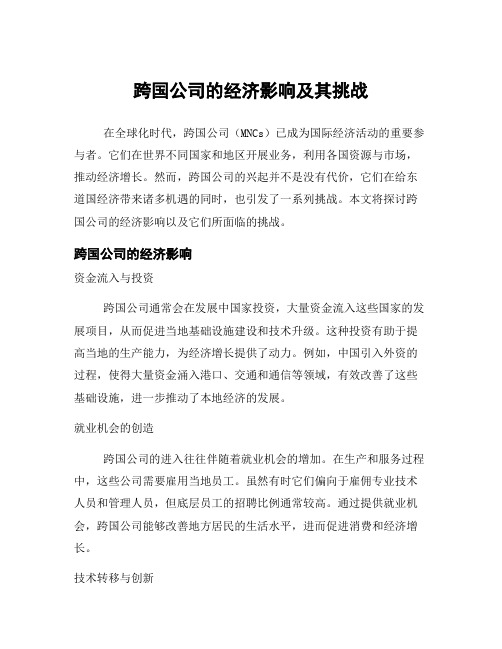
跨国公司的经济影响及其挑战在全球化时代,跨国公司(MNCs)已成为国际经济活动的重要参与者。
它们在世界不同国家和地区开展业务,利用各国资源与市场,推动经济增长。
然而,跨国公司的兴起并不是没有代价,它们在给东道国经济带来诸多机遇的同时,也引发了一系列挑战。
本文将探讨跨国公司的经济影响以及它们所面临的挑战。
跨国公司的经济影响资金流入与投资跨国公司通常会在发展中国家投资,大量资金流入这些国家的发展项目,从而促进当地基础设施建设和技术升级。
这种投资有助于提高当地的生产能力,为经济增长提供了动力。
例如,中国引入外资的过程,使得大量资金涌入港口、交通和通信等领域,有效改善了这些基础设施,进一步推动了本地经济的发展。
就业机会的创造跨国公司的进入往往伴随着就业机会的增加。
在生产和服务过程中,这些公司需要雇用当地员工。
虽然有时它们偏向于雇佣专业技术人员和管理人员,但底层员工的招聘比例通常较高。
通过提供就业机会,跨国公司能够改善地方居民的生活水平,进而促进消费和经济增长。
技术转移与创新跨国公司在技术和管理方面通常具有较强优势,它们在全球范围内推动技术转移,提升了东道国家的技术水平。
同时,它们也会激励本地企业进行创新竞争。
比如,在IT行业,大量跨国企业设立研发中心,吸引并培养本地技术人才,从而推动整个行业的发展。
外贸与市场扩大跨国公司通常会涉足多个国际市场,从而开辟新的销售渠道。
它们通过出口产品或服务,使得东道国的外贸总额上升。
此外,跨国公司的存在也增强了竞争,有助于提高产品质量和服务水平,消费者因此获益。
尤其是在技术密集型和品牌导向型领域,跨国公司能够推动整个行业的国际化进程。
跨国公司面临的挑战政策与合规风险跨国公司在开展业务时需要遵循东道国复杂且多样化的法律法规。
不同行业、不同地区之间的政策差异将对企业运营造成直接影响。
在一些国家,政策变动可能迅速且不可预测,比如税收政策、环保法规等,这会直接影响到公司的利润和长期投资决策。
商务英语uni4译文及答案
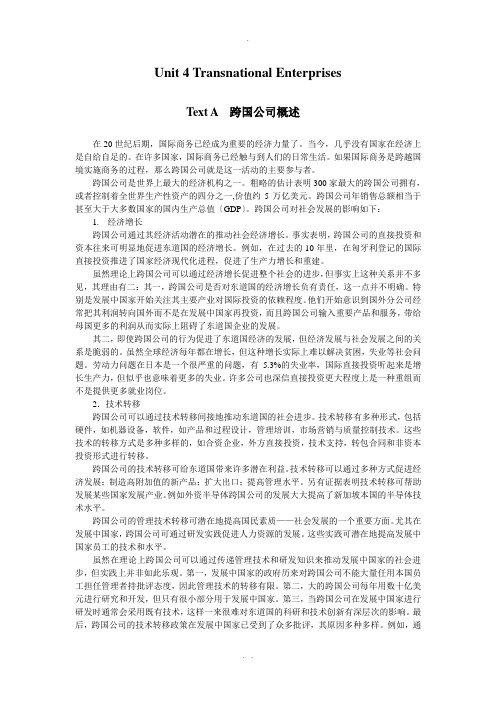
Unit 4 Transnational EnterprisesText A 跨国公司概述在20世纪后期,国际商务已经成为重要的经济力量了。
当今,几乎没有国家在经济上是自给自足的。
在许多国家,国际商务已经触与到人们的日常生活。
如果国际商务是跨越国境实施商务的过程,那么跨国公司就是这一活动的主要参与者。
跨国公司是世界上最大的经济机构之一。
粗略的估计表明300家最大的跨国公司拥有,或者控制着全世界生产性资产的四分之一,价值约5万亿美元。
跨国公司年销售总额相当于甚至大于大多数国家的国内生产总值〔GDP〕。
跨国公司对社会发展的影响如下:1.经济增长跨国公司通过其经济活动潜在的推动社会经济增长。
事实表明,跨国公司的直接投资和资本往来可明显地促进东道国的经济增长。
例如,在过去的10年里,在匈牙利登记的国际直接投资推进了国家经济现代化进程,促进了生产力增长和重建。
虽然理论上跨国公司可以通过经济增长促进整个社会的进步,但事实上这种关系并不多见,其理由有二:其一,跨国公司是否对东道国的经济增长负有责任,这一点并不明确。
特别是发展中国家开始关注其主要产业对国际投资的依赖程度。
他们开始意识到国外分公司经常把其利润转向国外而不是在发展中国家再投资,而且跨国公司输入重要产品和服务,带给母国更多的利润从而实际上阻碍了东道国企业的发展。
其二,即使跨国公司的行为促进了东道国经济的发展,但经济发展与社会发展之间的关系是脆弱的。
虽然全球经济每年都在增长,但这种增长实际上难以解决贫困,失业等社会问题。
劳动力问题在日本是一个很严重的问题,有5.3%的失业率,国际直接投资听起来是增长生产力,但似乎也意味着更多的失业。
许多公司也深信直接投资更大程度上是一种重组而不是提供更多就业岗位。
2.技术转移跨国公司可以通过技术转移间接地推动东道国的社会进步。
技术转移有多种形式,包括硬件,如机器设备,软件,如产品和过程设计,管理培训,市场营销与质量控制技术。
毕业设计外文翻译
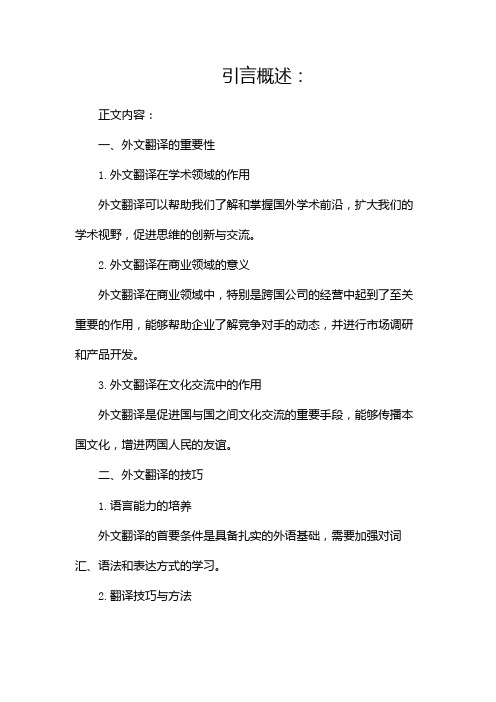
引言概述:正文内容:一、外文翻译的重要性1.外文翻译在学术领域的作用外文翻译可以帮助我们了解和掌握国外学术前沿,扩大我们的学术视野,促进思维的创新与交流。
2.外文翻译在商业领域的意义外文翻译在商业领域中,特别是跨国公司的经营中起到了至关重要的作用,能够帮助企业了解竞争对手的动态,并进行市场调研和产品开发。
3.外文翻译在文化交流中的作用外文翻译是促进国与国之间文化交流的重要手段,能够传播本国文化,增进两国人民的友谊。
二、外文翻译的技巧1.语言能力的培养外文翻译的首要条件是具备扎实的外语基础,需要加强对词汇、语法和表达方式的学习。
2.翻译技巧与方法翻译技巧包括对上下文的理解、逐词逐句的翻译和准确传达原意等。
同时,还可以运用翻译工具进行辅助翻译。
3.灵活运用翻译策略根据翻译的目的和要求,可以选择直译、意译或文化转换等不同的翻译策略。
三、外文翻译的难点1.语言和文化差异不同语言和文化之间的差异可能导致翻译难度增加,需要对原文进行深入理解,并灵活运用翻译技巧。
2.专业术语的翻译外文翻译中遇到的专业术语需要准确传达,这需要对相关领域的专业知识有一定的了解,可以借助词典和其他资源进行查询。
3.语义和语境的理解在翻译过程中,对原文的语义和语境理解不准确可能导致误译,需要细致入微地理解每个句子和词语的意义。
四、外文翻译中常见的问题1.语法和表达问题外文翻译中经常会涉及到语法和表达问题,需要对原文和翻译文本进行仔细对比和校正,确保语法和表达的准确性。
2.遗漏和加词问题翻译过程中可能会出现遗漏或者加词的情况,需要细心排查,保持原文和翻译文本的一致性。
3.歧义和模糊问题外文翻译中可能会存在歧义和模糊的词语或句子,需要根据上下文进行准确的判断和翻译。
五、外文翻译的应用1.学术研究和论文撰写外文翻译能够帮助学者了解国外学术动态,并为自己的研究提供参考资料,从而提升论文的质量和水平。
2.商业与经济领域外文翻译对于跨国公司的运营和市场开拓至关重要,可以帮助企业了解竞争对手和市场需求,为企业决策提供依据。
- 1、下载文档前请自行甄别文档内容的完整性,平台不提供额外的编辑、内容补充、找答案等附加服务。
- 2、"仅部分预览"的文档,不可在线预览部分如存在完整性等问题,可反馈申请退款(可完整预览的文档不适用该条件!)。
- 3、如文档侵犯您的权益,请联系客服反馈,我们会尽快为您处理(人工客服工作时间:9:00-18:30)。
外文翻译原文Some Effects of the Multinational CoporationsMaterial Source:Intereconomics Author:R.Krishnamurti,GenevaThe arguments against the multinational corporations, in the terms in which they have been presented by INTERECO- NOMICS, are obviously designed to stimulate discussion and counterarguments. Therefore the generalisations in these arguments require to be given further precision, detailed qualification and balanced analysis.Multinational or international corporations follow a world-wide strategy in the interest of the head office and therefore without any ties to a country. This must necessarily lead to a conflict of interests with the host country.The nature and degree to which multinational corporations follow a world-wide strategy vary according to the particular sector or sectors in which the corporation operates, the size of the parent firm and the network of subsidiaries which it has built up in host countries. The degree of control also differs as between various decision-making areas. Broadly, the major decision-making areas are financial policies including capital expansion, export policy, pricing policy, production planning, research and development and personnel policy. The structure and the form of organization of, for example, a large US multinational corporation tends to vary from those of a relatively smaller US corporation or for that matter, of a smaller European Corporation. Nevertheless the large corporations, particularly those of the US and quite a number of the larger European corporations, follow global strategies. Integrated networks of production and market allocation arrangements form the essential elements of the world strategy of the corporation which is carried out by centralised decision-making. The extent of autonomy which any particular subsidiary may be permitted to exercise would depend on its own size, and the importance of the market or markets for which it caters.The Multinationals' Objectives In LDCsThe activities of multinational in developing countries are governed by thefollowing objectives: obtaining, maintaining or expanding a foreign market, securrng supplies of raw materials, meeting and overcoming competitive forces in the international market which necessitate the development of foreign bases both at national and regional levels; and taking advantage of low labour costs in developing countries. When the manufacturing activities of multinationals in a developing country are essentially designed to enter, retain or expand the domestic market, the subsidiary may have a certain degree of autonomy in determining the level of domestic production and pricing policy, as long as it does not enter the international market, and the products in question are simple manufactures not involving the continuing supply of up-to-date technology. But if the subsidiary wants to enter the world market or expand its product lines or obtain up-to-date technology and know-how, or even make substantial capital outlay, considerations of the parent firm's global strategy will surely have a decisive effect. The USA accounts for the largest number of these large corporations, with a significant number coming also from Japan, the Federal Republic of Germany, the UK and France. Other countries, such as the Netherlands and Switzerland, have also a number of large multinationals.There are a large number of medium and small size enterprises of West European origin with networks of subsidiaries in developing countries. Sufficient evidence is not available on the extent of centraiised decision-making policies followed by the medium size and smaller enterprises, as compared with the large corporations. The general impression seems to be that the former probably apply policies which are less tightly knit and enforced from the centre than the latter. This is probably the case with subsidiaries in developing countries, which are themselves well established. Nevertheless, it is unlikely that the parent company foregoes control over major policies even in such cases.While the worldwide strategies of the multinational corporations may well be drawn up by the head office in the light of the interest of the corporation as a whole, this does not mean that the strategy is automatically not in harmony with the interests of the constituent parts of the corporation or of the country in which it operates. Obviously the stronger the position of individual subsidiaries, the greater will be their say on the strategy adopted. The decisions will inevitably reflect compromises within the power structure of the corporation.Necessary Adaptations of Worldwide StrategiesThe multinational corporation has necessarily to take into account, to a varying extent, the interests of the governments of both parent and host countries, asexpressed in their various laws and policies, namely requirements under antitrust laws or competition policies, national bans on sales of exports to particular countries, foreign exchange control and other screening procedures, etc. These undoubtedly affect the strategy of the multinational corporation, which is required to adapt its decisions to these legal and policy stipulations of governments. To the extent that these interests are difficult to reconcile, conflicts of interests arise. The question of permanent sovereignty over natural resources, which is generally accepted by the international community under various resolutions of the United Nations General Assembly has often been raised in connexion with cases involving nationalisation.As far as manufacturing industries are concerned, developing countries account only for relatively small shares of world production and trade. The developing countries' subsidiaries of multinational corporations will therefore have only a very limited influence on the corporations' worldwide strategy and their activities may well be fitted into a particular strategy agreed upon for the corporation as a whole. Whether this will lead to conflicts of interests between the developing country's government and the multinational corporation will depend on a number of factors, such as[] commitments by the parent company or head office for plant expansion in other countries,[] commitments or decisions with regard to exports for example, agreement that a particular subsidiary should supply particular markets,[] previous commitments or decisions with regard to the supply of specific raw materials and inermediate goods for example, the purchasing of such goods within the corporation, rather than using similar domestic goods which are available, [] decisions to process raw materials extracted by a subsidiary in a developing country in another country.If conflicts are to be limited both within the corporation and between the corporation and governments, obviously the worldwide strategy of a multinational corporation will need to adapt constantly to changing conditions and policies of governments. Above all, what is important is that multinational corporations should with regard to their activities in developing countries pay greater attention to the interests and desires of these countries for a faster rate of economic expansion and increased foreign exchange earnings.Multinationals have often used political and economic pressure specially in less developed countries (LDCs), in order to bring about political actions which suit theireconomic interests.The application of global policies by the multinational corporations frequently gives rise to conflicts. Because of the size, power and resources of the corporations, governments, particularly those of developing countries often feel that they do not have the power to deal or negotiate effectively with them. Frequently the domestic jurisdiction of the host country is inadequate. In many developing countries, despite general policies to encourage direct foreign investment, there is often suspicion that the multinational corporation is a foreign agent that tends to acquire control in key economic sectors. Many developed countries also have a similar experience, and like the developing countries, attempt to exercise control over the activities of the multinationals. The political aspect of the relationship of the host country to the corporation and vice versa assumes prominence in connexion with the issues of sovereignty over natural resources and the control of key industries. It also arises when cases of political interference occur and become public. The developing countries generally have weak negotiating power and not infrequently lack necessary information and expertise in their dealings with multinationals. These also create tensions.译文跨国公司的影响资料来源: 共同经济体作者:R.Krishnamurti,Geneva 对跨国公司的观点,在他们的条款已被国际经济学组学提出,显然是旨在鼓励讨论和反驳。
